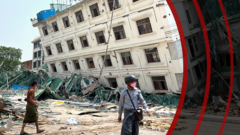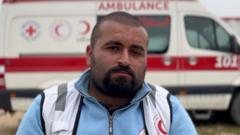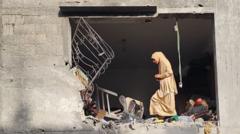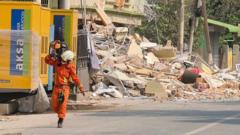A month-long blockade in Gaza has left residents grappling with extreme shortages of food and medical supplies, leading to a dire humanitarian crisis.
Blockade Tightens: Gaza Faces Humanitarian Catastrophe Amid Ongoing Conflict
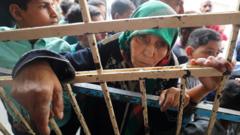
Blockade Tightens: Gaza Faces Humanitarian Catastrophe Amid Ongoing Conflict
As bakeries close and essential supplies dwindle, Gazans cope with severe shortages.
As the latest chapter in the conflict between Israel and Hamas unfolds, Gaza is facing an unprecedented humanitarian crisis following a month-long blockade that has shut down all UN-supported bakeries and left markets stripped of essential goods. The blockade has exacerbated the ongoing war, marking the longest interruption of aid in the nearly 18-month conflict. Residents now report widespread hunger, with many stating that this year's Eid al-Fitr festivities were the most devastating in their recent memories— “We can barely find one meal a day,” lamented Um Ali Hamad, a woman displaced from Beit Lahia.
Israel implemented the blockade on March 2 after Hamas declined to agree to an extension requested during a recent ceasefire. While Hamas continues to advocate for the release of hostages and a complete cessation of hostilities, UN agencies are increasingly sounding alarms over the dwindling availability of food, fuel, and medical supplies. They are urging world powers to intervene and advocate for lifting the blockade, citing international humanitarian obligations.
The World Food Programme (WFP) has closed its locations due to missing critical supplies, while hospitals have started rationing painkillers and antibiotics. ActionAid called the blockade “appalling,” warning of a looming crisis of starvation, while the UN declared the Israeli assertion of sufficient supplies in Gaza “ridiculous.” Abu Alaa Jaffar, a grandfather witnessing the bakery closures, described the situation as a catastrophe, emphasizing that bread, the primary staple, is now nearly unattainable.
With commercial goods essentially non-existent, local food production is at a standstill, and NGO-run kitchens are increasingly shutting down due to lack of resources. The WFP anticipates it will run out of food parcels within just days. In stark contrast, the Israeli military reports that the most recent ceasefire allowed a substantial amount of aid into Gaza, though they claim Hamas is hoarding resources.
As thousands of lives hang in the balance, UN agencies, including the WHO, warn that medical facilities are overwhelmed with casualties, and vital medical supplies are rapidly depleting. Doctors are resorting to makeshift solutions in surgeries due to a lack of essential materials.
Amid ongoing violence that resumed on March 18, with the death toll surpassing 1,000 Palestinians and numerous injuries reported, international calls for peace and humanitarian access have intensified. South Africa's allegations against Israel at the International Court of Justice concerning potential genocide underscore the urgent need for diplomatic efforts. Mediators are working to find a path back to ceasefire, but with escalating accusations and violence, an immediate resolution remains daunting.

